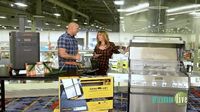As 2025 unfolds, homeowners and wellness enthusiasts alike are embracing a year marked by innovation, sustainability, and a striking sense of individuality. From cutting-edge designs that prioritize comfort and personality in interiors to the growing impact of technology on personal health, the trends we're witnessing reflect a more personalized and mindful approach to living.
At the forefront of the home improvement scene, the National Hardware Show (NHS) has unveiled a plethora of products aimed at cultivating precise projects and enhancing outdoor living experiences. Participants Kathryn Emery, a home improvement and lifestyle expert, and Chip Wade, a celebrity craftsman, emphasized the show’s significant offerings. "The NHS boasts everything from BBQ & grills to cutting-edge technology and tools, catering to all your project needs," stated Emery during the show held on March 19, 2025. With items ranging across categories such as outdoor and garden supplies, building materials, and homewares, the NHS has proven to be an essential stop for those looking to upgrade their living spaces.
In parallel, the wellness industry is undergoing a profound transformation. This year, tech-driven solutions, sustainable practices, and holistic approaches are redefining personal health and self-care. According to industry experts, technology, particularly artificial intelligence (AI), is revolutionizing individual health management. Wearable devices, such as Garmin, Oura, Apple Watch, and Whoop, allow users to track fitness activity, sleep, and stress, making health oversight more accessible.
"AI isn't going anywhere, so why not leverage it to optimize our well-being?" said an expert at a recent wellness summit. With these advancements, consumers are encouraged to delve into hyper-personalized fitness plans and mental health tools, allowing for a uniquely tailored experience.
In tandem with these tech trends, sustainability stands out as a growing necessity rather than a fleeting trend. Eco-friendly self-care methods, including refillable skincare products and biodegradable packaging, are now viewed as integral components of wellness. As one wellness advocate highlighted, "When you choose sustainable products, you're supporting not only your own health but also the planet's." This alignments with the values of a society increasingly aware of its ecological footprint.
Moreover, functional foods are gaining traction, addressing both nutrient density and health benefits with options like adaptogens, nootropics, and probiotics leading the charge. “Eating with intention supports your mental and physical health,” explained a nutritionist, promoting this conscious eating movement.
As people prioritize quality sleep more than ever, emerging technologies are tapping into this need. AI-driven sleep trackers and personalized coaching methods are helping individuals enhance their sleep hygiene, reflecting a departure from the previously celebrated hustle culture. Experts in sleep health are advising consistent bedtime routines and environments that foster rest, emphasizing the profound impact of sleep on health and productivity.
Alongside these trends in personal health, British design practices are also evolving, with influencers at London Design Week showcasing themes that encourage personal expression and warmth in interior spaces. A notable shift is the embrace of asymmetry in design, which decor specialists like Kelly Hoppen highlight as a modern move away from the previously rigid expectations for coordinated home aesthetics. "There is a noticeable shift towards embracing asymmetry in interiors, which allows for more creative expression and unexpected design moments," remarked Hoppen.
Designers are thrilled about the growing embrace of layered rooms, where depth is achieved through mingling various textures and colors. As designer Emma Sims-Hilditch noted, “The more pattern, color, and mismatched furniture, the better.” This appreciation for depth is enhanced by the careful use of lighting, which can bring a room's character to life.
Additionally, a broader palette of colors is securing a place in British interiors again. "Color is an essential tool in shaping atmosphere and emotion within a space," explains Brigitta Freund, with vibrant hues making a dramatic return in wallpaper and paint choices.
Natural elements like leafy greens and botanical themes are consistently reimagined in British design. Whether it’s through artwork or real houseplants, the connection to nature is being reinforced in aesthetic choices. Alexander Hoyle, a Botanist, adds, "Who doesn’t love plants? They help soften spaces and bring life to the indoors."
All these trends encapsulate a broader message: 2025 is about carving out personalized spaces that resonate with personal well-being and individual tastes. From the way we improve our homes to how we prioritize wellness, there’s a collective understanding that comfort and authenticity matter more than ever.
Ultimately, as we delve deeper into 2025, the blend of modernity with traditional practices—whether in design aesthetics or personal wellness—encourages us to create living environments that are as nurturing as they are aesthetically pleasing. So whether you're revamping a garden or taking steps toward a more sustainable lifestyle, this year holds the promise of meaningful change for all.






